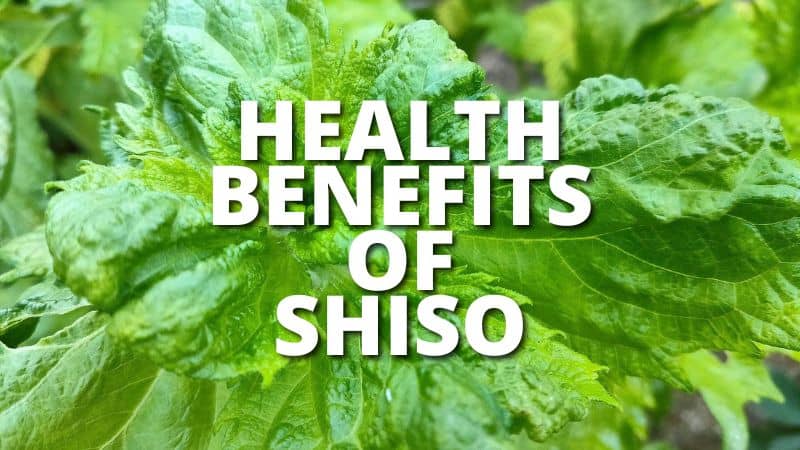Shiso, a leafy herb often green or purple, offers unique health benefits along with a distinctive flavor.
Popular in Asian cuisines, shiso is valued not only for its taste but also for its positive effects on health.
Historically, people have used shiso as a remedy for common ailments.
In modern times, this herb continues to gain attention due to its nutritional properties.
We’ll explore several specific ways shiso can support better health.
1. Anti-Allergic Properties of Shiso
Shiso, also known as perilla, is a herb rich in rosmarinic acid, a natural compound that may help reduce allergy symptoms.
Both green shiso and red shiso contain natural antihistamines that can lower the body’s allergic response to pollen, dust, and other triggers.
Research suggests that shiso may help relieve sneezing, itching, and runny noses caused by seasonal allergies by reducing the release of histamines.
Its anti-inflammatory effects may also ease symptoms of skin allergies, such as rashes and irritation.
Many people add green shiso to soups, salads, or teas to support their immune systems during allergy season.
Meanwhile, red shiso is often used in pickled dishes and traditional remedies, where it is believed to help with respiratory health.
Including shiso in your diet may be a natural way to manage allergies, but it is always best to check with a doctor before using it as a treatment.
📙 Potential Health Benefits of Quassia Amara
2. Respiratory Health Support
Shiso has long been used to treat respiratory issues such as coughs, asthma, and bronchitis.
It contains compounds that relax the airways, making it easier to breathe comfortably.
Drinking tea made from shiso leaves helps soothe a sore throat and reduce coughing.
Additionally, shiso can help clear mucus, reducing congestion in the lungs.
Regular use supports improved respiratory function and overall lung health.
📙 Potential Health Benefits of Perilla
3. Cancer-Fighting Compounds in Shiso
Shiso is a powerful herb with medicinal properties that may help protect the body from diseases, including certain cancers.
It is rich in antioxidants, such as flavonoids and polyphenols, which help fight harmful free radicals that can damage cells.
By reducing oxidative stress, these compounds may lower the risk of cancer and slow down the growth of abnormal cells.
Shiso is also rich in calcium and iron, which support bone health, red blood cell production, and overall well-being.
Its unique flavor, which is slightly minty and spicy, makes it a tasty addition to soups, salads, and teas.
Many people enjoy fresh shiso leaves in sushi and other dishes to benefit from both its taste and health properties.
Adding shiso to your diet can be a simple way to boost your intake of protective nutrients, but it’s best to combine it with a balanced, healthy lifestyle.
📙 Potential Health Benefits of Golpar
4. Improved Blood Circulation
Vitamin E found in shiso significantly enhances blood circulation, helping nutrients and oxygen move efficiently throughout the body.
Improved blood flow can raise energy levels, reducing fatigue and tiredness.
Regular intake of shiso can also maintain the health of blood vessels, preventing cardiovascular issues.
By enhancing circulation, shiso supports better overall organ health.
Adding shiso to meals is a simple way to keep circulation healthy and effective.
📙 Potential Health Benefits of Avocado Leaves

5. Heart Health Support
Shiso, a member of the mint family, contains antioxidants and healthy fats that help protect the heart.
These compounds work to lower bad cholesterol levels, which can reduce the risk of heart disease and clogged arteries.
By improving circulation and reducing inflammation, shiso may also help keep blood pressure stable and arteries flexible.
The antioxidants in shiso protect blood vessels from oxidative stress, which can lead to long-term heart problems.
Incorporating shiso into your diet by adding it to soups, teas, or salads can be an easy way to support cardiovascular health.
Its fresh, slightly spicy taste makes it a flavorful garnish for rice dishes, grilled meats, and seafood.
Eating shiso regularly, along with a balanced diet and exercise, may contribute to better heart health over time.
📙 Potential Health Benefits of Andrographis Paniculata
6. Bone and Teeth Strengthening
Calcium and magnesium in shiso are vital for developing strong bones and teeth.
Regularly consuming shiso can help reduce the risk of bone diseases like osteoporosis.
These minerals strengthen bones, helping prevent fractures and breaks.
Eating shiso frequently can also enhance tooth health, protecting against tooth decay.
Shiso is an enjoyable way to meet your body’s daily calcium requirements.
📙 Potential Health Benefits of Euphorbia
7. Iron for Blood and Hormonal Health
Shiso leaves contain iron, an essential mineral that helps the body produce healthy red blood cells and transport oxygen efficiently.
Eating shiso regularly can help prevent iron deficiency anemia, which often causes fatigue, dizziness, and weakness.
Since iron plays a key role in hormone production, consuming enough of it is especially important for teenagers and women.
Pairing shiso with vitamin C-rich foods like plums can help the body absorb iron more effectively.
Vegetarians, who may struggle to get enough iron, can enhance their meals by adding shiso to rice or soups or dipping it in soy sauce for extra flavor.
Another delicious way to enjoy shiso is by frying it as tempura, creating a crispy and nutrient-rich snack.
Including shiso in a balanced diet supports both blood health and hormone regulation, keeping the body strong and energized.
📙 Potential Health Benefits of Kudzu
8. Digestive Health Enhancement
Dietary fiber in shiso leaves supports smooth digestion and regular bowel movements, reducing constipation and digestive discomfort.
Shiso helps relieve issues like bloating and gas, promoting overall digestive comfort.
Its antibacterial qualities help maintain a healthy balance of gut bacteria.
Regularly eating shiso can significantly improve digestion and gut health.
Incorporating shiso into meals keeps your digestive system working well.
📙 What You Need to Know About the Health Benefits of Herbs
9. Immune System Boost
Shiso is high in vitamin C, a crucial nutrient that strengthens the immune system and helps the body fight infections.
Its powerful antioxidants protect cells from damage and may reduce the severity and duration of colds.
Eating shiso regularly can improve the body’s ability to resist illnesses, making it a great addition to a healthy diet.
Many people enjoy fresh shiso with sashimi, as its antibacterial properties may help prevent foodborne illnesses.
Pickled umeboshi plums are often eaten with shiso because their combination provides extra immune-boosting benefits.
Shiso, a herb related to basil, can be used in soups, teas, or salads to add both flavor and nutrients.
By incorporating shiso into your meals, you can support your immune system and stay healthier throughout the year.
10. Antiseptic Properties for Food Safety
The natural antiseptic qualities in shiso leaves help protect food from harmful bacteria.
Including shiso in dishes like sushi or salads helps keep them fresh and safe to eat.
This herb helps prevent foodborne illnesses by reducing bacterial growth.
Regular use of shiso ensures safer, cleaner, and tastier food preparation.
Shiso enhances the flavor and safety of many dishes with its protective properties.
💡 Conclusion
Shiso provides diverse health benefits, from easing allergies to strengthening bones.
Its nutrients support heart health, digestion, immunity, and even protection against serious illnesses.
Easy to include in meals, shiso enhances your health in multiple practical ways.
This herb’s nutritional profile makes it an excellent addition to any balanced diet.
Regular consumption of shiso can significantly improve overall wellness and quality.
⛑️ Safety First
Shiso may have potential health benefits, but some are based on theories or personal stories, not proven facts.
People who take blood thinners, have allergies to mint-family plants, or are pregnant should be careful or avoid it.
Before using Shiso for health reasons, talk to a doctor to make sure it’s safe for you.
It’s also important to do your research and ask a health professional for advice.
Never use Shiso as a replacement for medical treatment without expert guidance.
⚠️ Content Disclaimer
This article is for general information only and should not be seen as medical, health, or professional advice.
You may treat it for entertainment purposes and not as a guide for making health decisions.
Always talk to a doctor or expert before trying anything new for your health.
The information here may not be complete, up to date, or proven by science.
You are responsible for doing your research and making safe choices.

